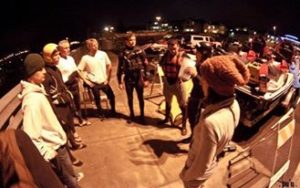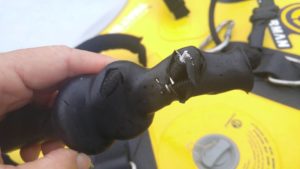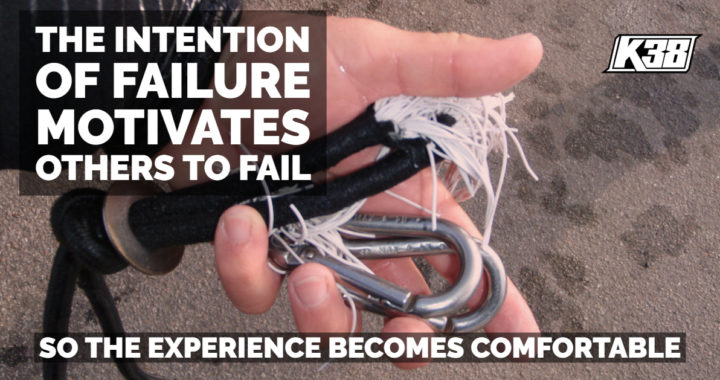INTENTION OF FAILURE
The intention of failure motivates others to fail. So the experience becomes familiar and then everything is okay in the worst possible way.
What is the answer for this?
The framework of the answer is in the validity of achievement.
Is achievement protected in the measure of repetitive failure so that only one element of the hierarchy cannot be disputed?
Some people don't want to succeed because they are only familiar with not forging ahead. Sometimes its due to budget, sometimes to political edges and sometimes its a personal problem. And sometimes its because of poor imitation.
Familiarity can become dangerous if its aligns with complacency. High risk operations require a higher level of accounting. Don't slack or back down, stay on the edge of concern and manage it. Slow things down if its getting too fast.
How about we focus on the definition of failure:
noun
1. an act or instance of failing or proving unsuccessful; lack of success:
His effort ended in failure. The water rescue was a failure.
2. nonperformance of something due, required, or expected:
a failure to do what one has promised; a failure to appear.
3. a subnormal quantity or quality; an insufficiency:
the failure of the team
SACRED TRUST

Don't assume everything will be fine. Know your team. Know your equipment. Risk is a real problem for us, managing it is even more severe. Take inventory and be honest. You will feel better and everyone will benefit from your leadership concerns
What is our rational purpose of the consequence of lifesaving? WE have several elements:
1. The Mindset of the Team and Leadership
2. The assets put in place
3. The management of the marine unit needs
We can outline in a practical manner the route of failure.
Its conducted by the review of our mishaps, the study of maritime history or the evaluation of other agency mishaps and an honest accounting of the pitfalls therein.
The paramount issue that faces our Maritime RWC culture is ‘what do to do about that? A discovery phase must be embarked.
One answer is to find the meaning of the utility of RWC purpose and effective us and the associated safety of those risks observed. We need to question but not miss the point.
We have to discover these before we are led away to another mishap by those who enforce failure by doing nothing at all to remedy it.
In our world we deal with suffering, either from malevolence, natural incidents, accident or ignorance, these are some of the instance of accident or peril.
We are a point of contact in that path, but recovery continues after tragedy for everyone. Hence, review, review, review!
Bearing the tragic consequence surrounding water rescue, is the notice of engaging in something meaningful, something sacred.
For those who lost their compassion they often choose the adversarial account of survivors, distancing themselves from the meaningful action that is worth the suffering and controversy to modernize a program.
Allow your survivors to teach you well.
Question a way of being that may need to be modified or retired. Courage to conduct actions in a manner that can reveal itself in the moment of risk that are relationship bound. You, your craft, your mechanic, your team, the survivors.
This is the price of experience.
COURAGE

Its even more important to question products, their structural failures and common sense red flags. If you have catastrophic failures with purchased gear, document the issues and contact the manufacturer with your concerns.
Ask for for remedial solutions. Make sure that it's not because you abused the product or mismanaged it, and if it is - address that head on with your team.
Taking responsibility with your own volition for the suffering and tragedy of those in peril while you are operating and work to remediate it as a conduit of good. You may be saving your own life first.
Here is what I tell myself when working: I am you and you are I. I am like the survivor and they are like myself. My experience is that I want to come home safely, not take reckless actions into emotion, but to be responsible for my actions and remediate accordingly to success.
I don’t want to place a barrier in my experience by jumping a wave with my RWC, operating in fear, not having technical control in confined spaces and on and on…
Reject the excuses of those who provide barriers and fail to bear the responsibility of leading properly. Question everything presented to you in the RWC training workups by conducting you own vigilance.
• Get to know the maritime community.
• Become knowledge of the ATONs
• Understand the mechanics of your Rescue Water Craft and appropriate maintenance
• Learn about atmospheric pressure systems and water conditions
• Investigate new technologies and products
• Become curious about private companies and their leading edges of real world experience
If you do not believe this is relative and reject it there is something wrong in your soul. There is a path of rejecting failures that would present to you your own.
Fear the lack of progress. It can cause great harm to you and others.
__________
Posted 1.13.2019
Have any questions? Join the Rescue Water Craft Association
and discover what your community is doing to modernize standards, safety and reduce liability!
Join the Rescue Water Craft Association
Content Creator: Shawn Alladio cares most about her community and the culture surrounding the safety of event service providers and Rescue Water Craft operators, working hard and dedicated towards protecting their reputation, distributing safety information and continuing to train these amazing individuals to the highest standards of care.
Use at your own risk. Please take a qualified Rescue Water Craft training course and maintain proper records and respect all the PWC, RWC, PPE, and gear OEM manufacturer warning labels and cautions.
